Many beautiful flower names start with a. One of the most well-known is the Amaryllis, which is prized for its large, showy blooms that come in a range of colors from white to pink to red. Another popular A flower is the Aster, which is often used in gardens and floral arrangements for its star-shaped blooms in shades of purple, pink, and white.
The Anemone is another eye-catching A flower, with its delicate petals in shades of white, pink, and purple. The Alstroemeria, also known as the Peruvian lily, is a beautiful flower with striped petals that come in a variety of colors. Finally, the Azalea is a gorgeous flowering shrub that produces clusters of blooms in shades of pink, white, and red.
Whatever your style or preference, there is sure to be an A flower that will catch your eye and brighten your day.
Flowers Name Starting with A
Aconite
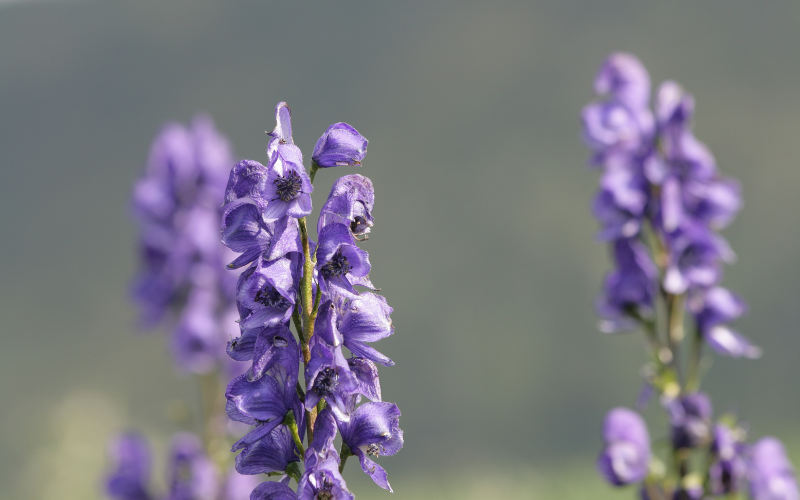
Aconite is a beautiful flower. It is also known as monkshood or wolf’s bane The plant is native to Europe and Asia and has been traditionally used to treat a variety of conditions, including pain, fever, and anxiety.
Aconite flowers come in a variety of colors, including shades of blue, purple, white, and yellow. The size of the Aconite flower can vary depending on the species, but generally, the flowers are small to medium-sized.
| Scientific Name | Aconitum |
| Native Range | Europe, Asia, and North America |
| Flowering Season | Late summer and early autumn months |
African Lily
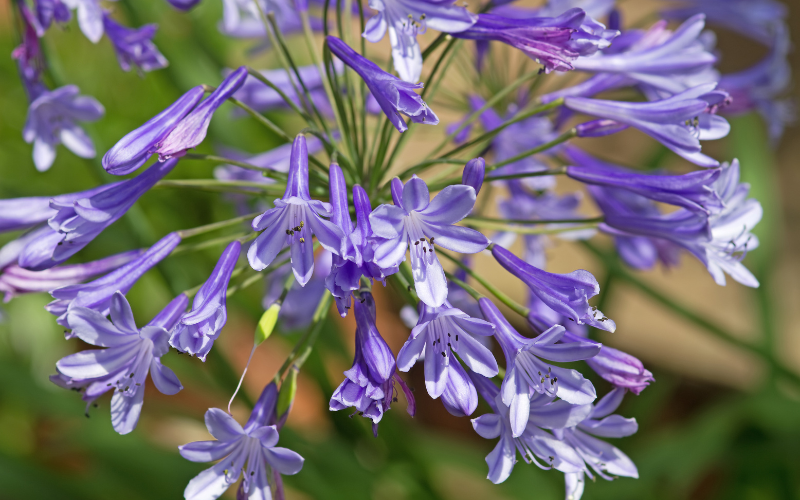
The African Lily is a truly stunning plant that is guaranteed to grab your attention with its beautiful blue flowers. Also known as the Agapanthus, this plant is native to South Africa and is a member of the lily family.
It’s a hardy perennial that is easy to grow and requires minimal maintenance. African Lilies are perfect for adding a touch of elegance to any garden, and they make beautiful cut flowers for indoor arrangements as well. They thrive in full sun or partial shade and prefer well-drained soil.
| Scientific Name | Agapanthus |
| Native Range | Southern Africa |
| Flowering Season | Summer |
Allium
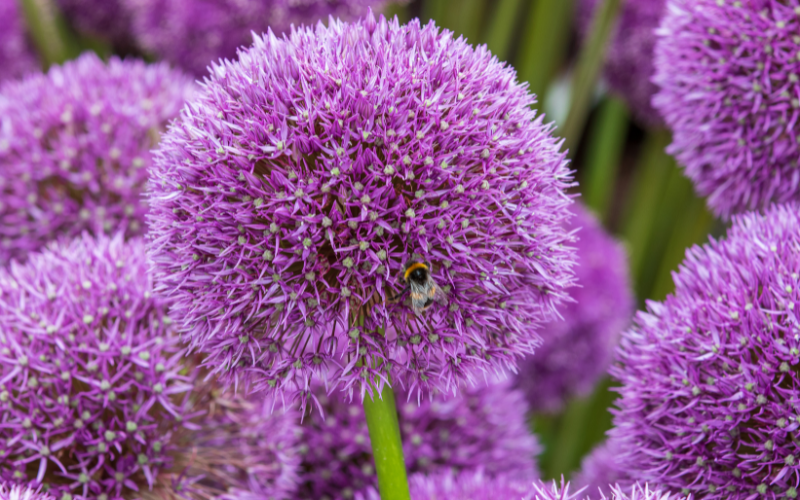
Allium is a genus of plants that includes popular vegetables such as onions, garlic, and shallots. Alliums have a unique flavor and are used in various cuisines around the world.
They are a great source of antioxidants and have numerous health benefits, including reducing cholesterol levels, improving digestion, and boosting the immune system. Alliums add a beautiful and distinctive look to any garden with their tall and colorful blooms.
| Scientific Name | Allium |
| Native Range | Europe, Asia, North America, and Africa |
| Flowering Season | Late spring to early summer |
Anemone
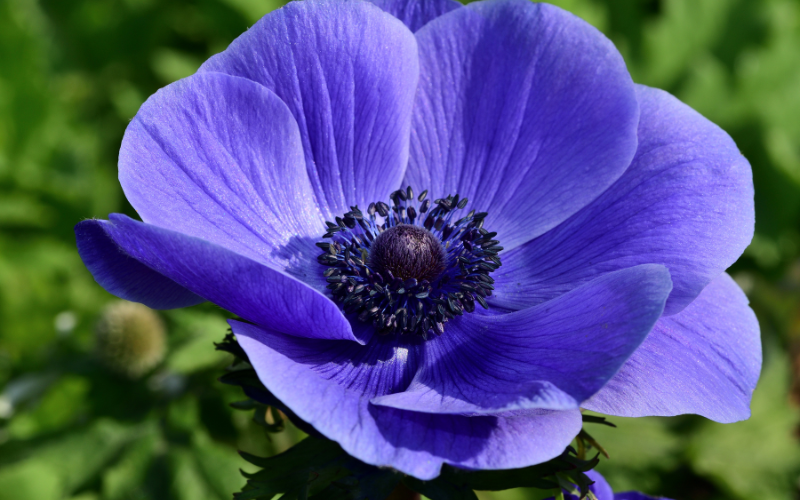
The anemone is a beautiful sea creature that can be found in oceans around the world. These striking creatures are known for their bright colors, which can range from deep red to vibrant green.
They are also known for their long tentacles that they use to catch their prey. Anemones are usually found attached to rocks or other hard surfaces in shallow waters. Anemones have also been used in traditional medicine for their antibacterial properties. Overall, the anemone is a fascinating creature that adds to the beauty and diversity of our oceans.
| Scientific Name | Anemone |
| Native Range | Europe, Asia, and North America |
| Flowering Season | Spring and early summer |
Anthurium
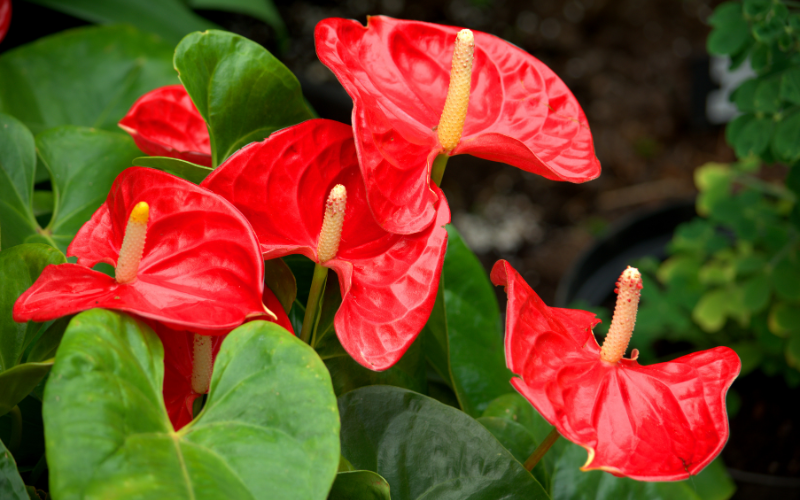
Anthurium is a beautiful flowering plant that is commonly grown for its brightly colored blooms and attractive foliage. The plant is native to the tropical rainforests of Central and South America and prefers warm, humid conditions.
Anthurium plants come in a wide range of colors, including shades of red, pink, white, and orange, and can add a vibrant touch to any space. They are relatively easy to care for and can thrive indoors or outdoors in a shaded area. Anthuriums are also known for their purifying properties, helping to improve the air quality in your home or office.
| Scientific Name | Anthurium andraeanum |
| Native Range | Central and South America |
| Flowering Season | Spring and summer |
Angelonia
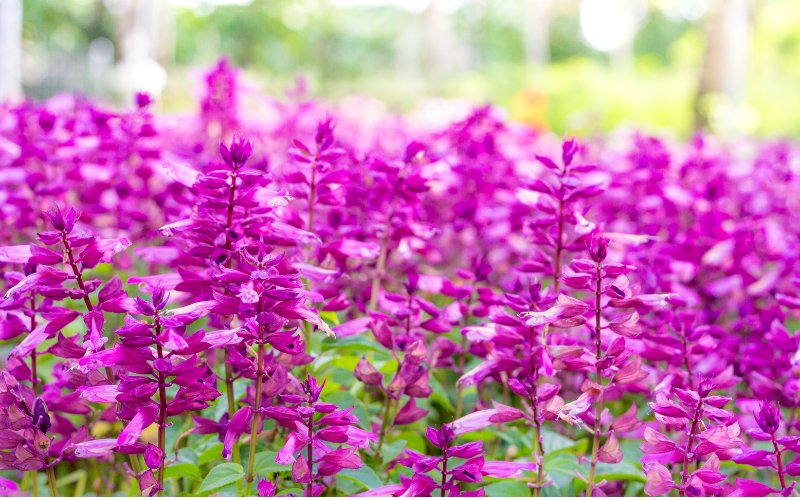
Angelonia is a beautiful flowering plant that is native to Mexico, the West Indies, and Central and South America. The plant is known for its long and slender stems which can grow up to 18 inches tall, and its blooms which come in a range of colors including pink, purple, blue, white, and lavender.
Angelonia is a popular choice for gardeners because it is easy to grow and low maintenance. The plant prefers a sunny location and well-drained soil and needs to be watered regularly. Angelonia is also known for being drought-tolerant and can adapt well to different soil types.
| Scientific Name | Angelonia angustifolia |
| Native Range | Mexico and parts of Central America |
| Flowering Season | Spring, summer |
African Daisy
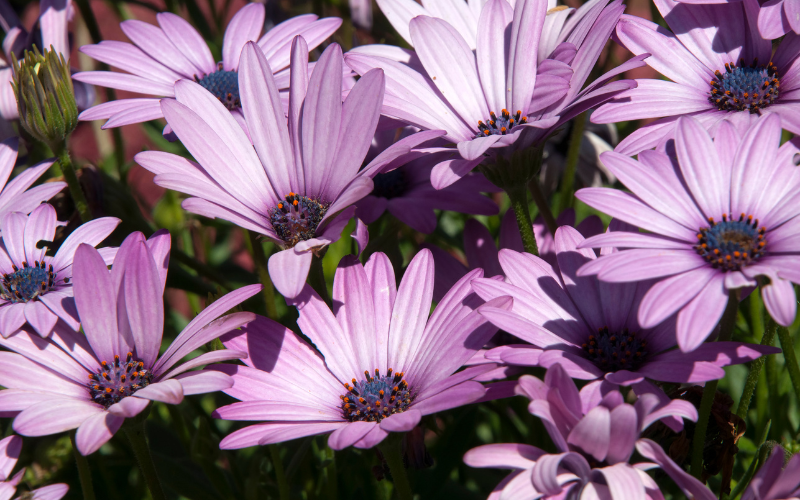
The African Daisy is a beautiful flower that is native to South Africa but has become a popular garden flower all around the world. The African Daisy has large, daisy-like flowers that come in a range of colors, from white to pink, orange, and even purple.
These flowers bloom in the summer and fall, and they are easy to care for. They thrive in full sun and well-drained soil, and they can tolerate drought and heat. African Daisies are also known for attracting butterflies and bees to your garden. They make great cut flowers, and they can add a pop of color to any garden or landscape.
| Scientific Name | Osteospermum |
| Native Range | South Africa and Namibia. |
| Flowering Season | Spring, summer |
Astilbe
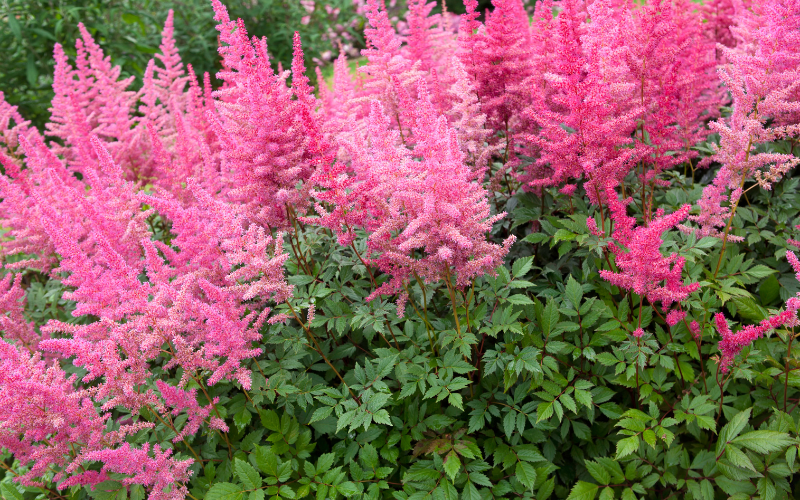
Astilbe is a beautiful plant that is widely known for its feathery and colorful plumes that bloom in spring and summer. With a variety of colors ranging from white, pink, red, and lavender, these flowers are a stunning addition to any garden or landscape.
Astilbe plants prefer moist soil and partial shade and thrive in areas with high humidity. They are easy to care for and require minimal maintenance, making them a great option for beginner gardeners. Astilbe plants are also a popular choice for wedding bouquets and floral arrangements due to their delicate and romantic appearance.
| Scientific Name | Astilbe |
| Native Range | China, Japan, and Korea |
| Flowering Season | Summer |
Aster
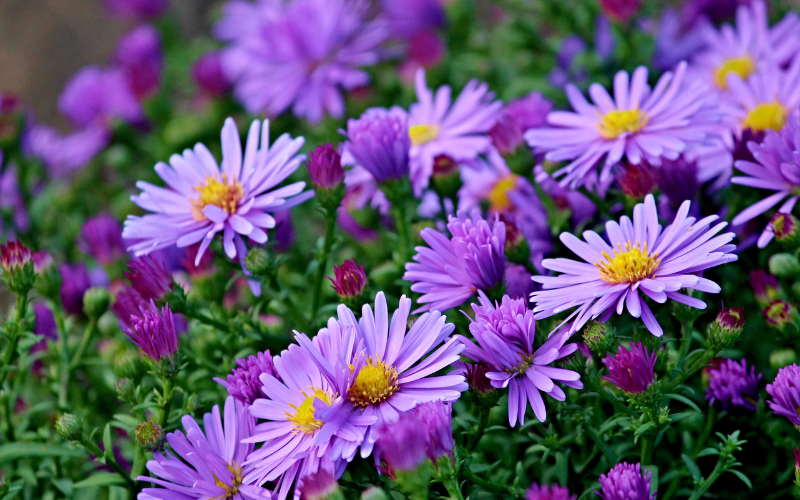
Aster is the scientific name for a beautiful and popular flower that is known for its vibrant colors and delicate petals. This flower is native to Europe, Asia, and North America.
The name Aster is derived from the Greek word for “star,” and it is easy to see why. The flower’s petals are arranged in a star shape around the center of the bloom. Asters come in a wide range of colors, including pink, purple, blue, red, and white. Asters are also used in herbal medicine as a natural remedy for various ailments, including headaches and respiratory infections.
| Scientific Name | Asteraceae |
| Native Range | North America, Europe, and Asia |
| Flowering Season | Late summer |
Amaryllis
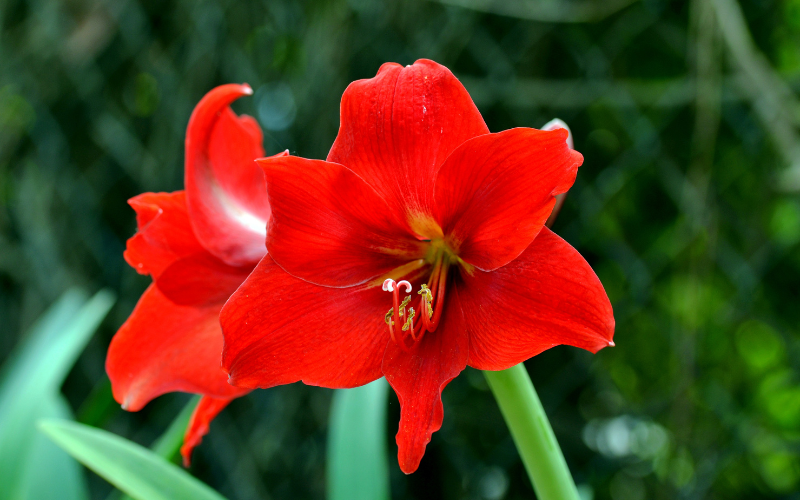
Amaryllis is a beautiful flowering plant that is native to South America. This stunning plant produces large, trumpet-shaped flowers which come in a variety of colors including red, white, and pink.
The Amaryllis plant is typically grown indoors and it is often used as a decorative plant during the holiday season. One of the unique qualities of this plant is that it can grow very tall, up to 2-3 feet, and it produces multiple flowers on each stem. Amaryllis is relatively easy to care for and it requires moderate sunlight, regular watering, and well-draining soil.
| Scientific Name | Hippeastrum |
| Native Range | South Africa |
| Flowering Season | During the winter or early spring |
Aubrieta deltoidea
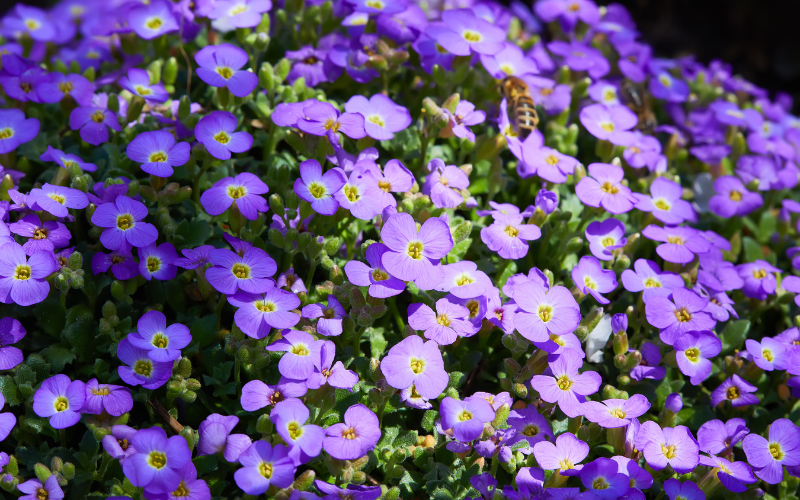
Aubrieta deltoidea is a beautiful flower. It is commonly known as Aubrieta or Rock Cress and is a flowering perennial plant native to southeastern Europe. The flowers of Aubrieta deltoidea are small, measuring around 1 inch (2.5 cm) in diameter.
The flowers come in a variety of colors, including shades of purple, pink, blue, and white. Aubrieta deltoidea typically blooms in spring, usually from April to May, depending on the local climate. Aubrieta deltoidea is a relatively low-maintenance plant.
| Scientific Name | Aubrieta deltoidea |
| Native Range | Europe |
| Flowering Season | Spring |
Anthericum
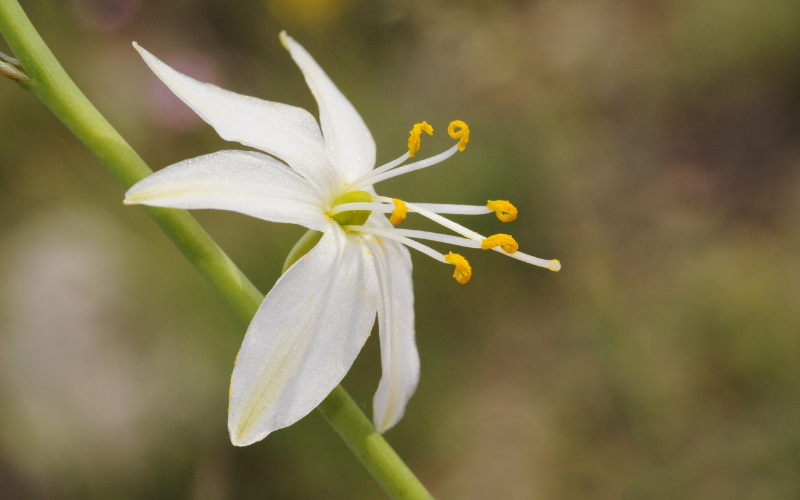
The Anthericum is a strikingly beautiful flower. It is commonly known as St. Bernard’s Lily or St. Bruno’s Lily. The flowers of Anthericum liliago are small, star-shaped, and typically white or pale yellow. Each flower has six petals that spread out from a central point, giving it a star-like appearance.
Anthericum liliago usually blooms in late spring to early summer, typically from May to June. The plant forms clumps and can reach a height of 1 to 3 feet (30 to 90 cm). Anthericum liliago is generally a low-maintenance plant. It requires regular watering during the establishment phase.
| Scientific Name | Anthericum |
| Native Range | Europe, South Africa, Canary Islands |
| Flowering Season | Europe, South Africa, Canary Islands |
Alyssum
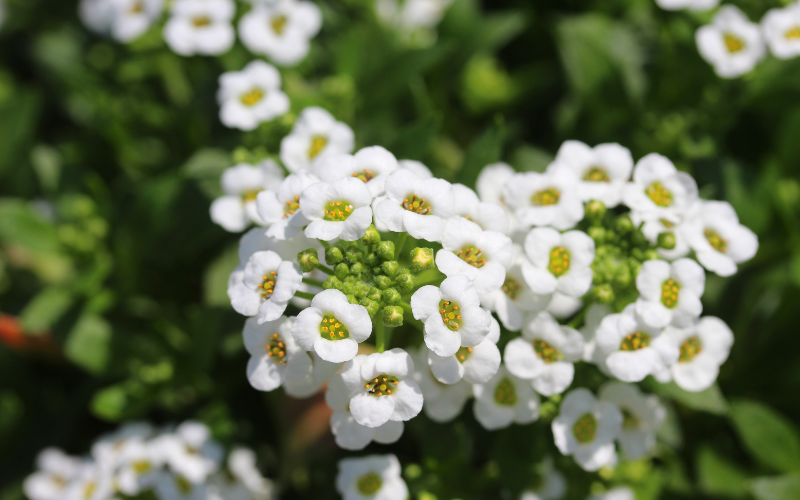
The alyssum flower is a delicate and versatile plant that brings beauty and charm to any garden. Alyssum flowers are small and delicate, with four petals that are arranged in a cross shape. The petals can come in various colors, including white, pink, lavender, and purple.
Alyssum plants usually bloom in spring and continue to flower throughout the summer. These tiny flowers come in various shades of white, pink, purple, and yellow. Alyssum is generally low-maintenance.
| Scientific Name | Lobularia maritima |
| Native Range | Italy, Greece, Spain, and parts of North Africa |
| Flowering Season | Spring, fall |
Angel’s Trumpet
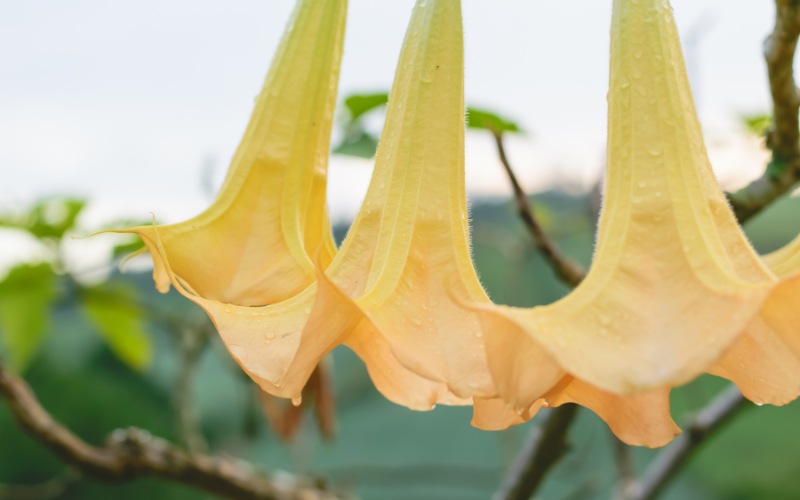
Angel’s Trumpet is a beautiful flower. It is scientifically known as Brugmansia. This flower is native to South America. Angel’s Trumpet flowers are large and showy, typically measuring 6 to 10 inches (15 to 25 cm) in length.
They come in a range of colors, including white, pink, yellow, orange, and peach. Angel’s Trumpet plants typically bloom in cycles throughout the warm months, from late spring to fall. Angel’s Trumpet plants prefer a warm and sunny location with well-draining soil.
| Scientific Name | Brugmansia |
| Native Range | South America |
| Flowering Season | Spring, summer |
Anise Hyssop
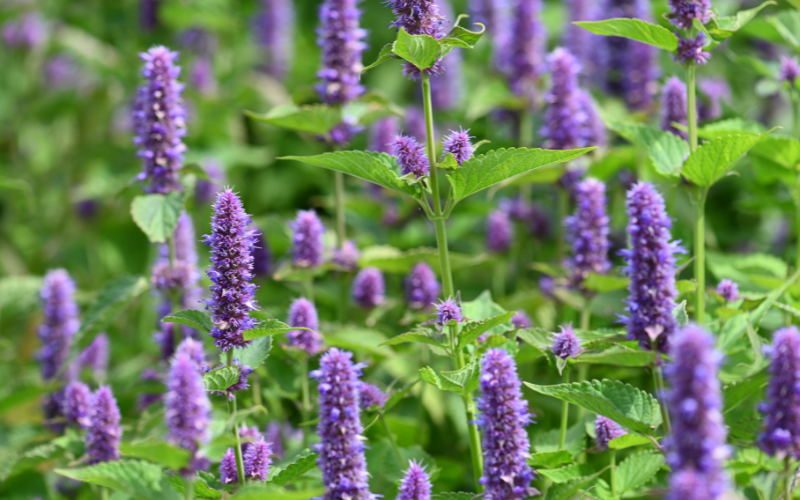
Anise Hyssop is a stunning flowering plant. It is native to North America. The flowers are typically lavender, blue, or purple, although there are also cultivars available with pink or white blooms. Anise Hyssop blooms from mid-summer to early fall, typically from July to September.
Anise Hyssop has a bushy and upright growth habit, reaching a height of about 2 to 4 feet (60 to 120 cm) and spreading about 1 to 2 feet (30 to 60 cm) in width. Flowers attract a wide range of bees, and butterflies making it a perfect addition.
| Scientific Name | Agastache foeniculum |
| Native Range | North America |
| Flowering Season | Summer |
Annual Phlox
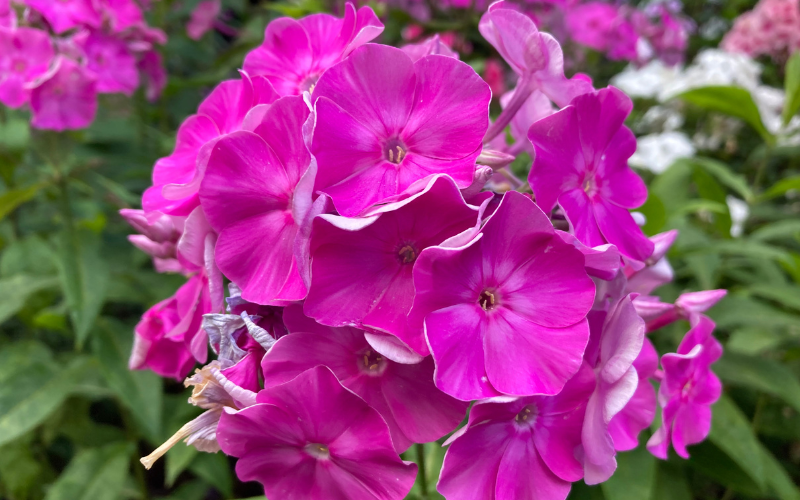
Annual Phlox is a beautiful flower. It is also known as Phlox drummondii. It belongs to the Polemoniaceae family and is native to Texas and Mexico. Flowers come in a wide range of colors, including shades of red, pink, purple, white, and bi-color combinations.
Annual Phlox typically blooms from late spring to early summer. Annual Phlox plants have a bushy and compact growth habit, typically reaching a height of 6 to 18 inches (15 to 45 cm). Annual Phlox is relatively low-maintenance.
| Scientific Name | Phlox drummondii |
| Native Range | North America |
| Flowering Season | Summer |
Ageratum Houstonianum
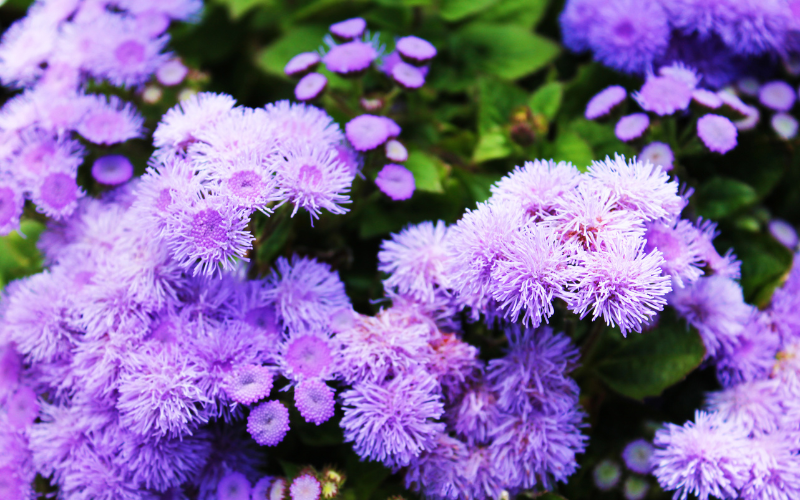
The Ageratum Houstonianum is a stunning and versatile flower. It is native to Central America. With its fluffy clusters of tiny flowers in shades of blue, purple, and white, this plant is a true sight to behold.
Ageratum houstonianum is a low-growing plant that usually reaches a height of 6 to 18 inches (15 to 45 cm). Ageratum plants bloom from late spring or early summer and continue to produce flowers throughout the summer and into the fall. Ageratum is generally a low-maintenance plant.
| Scientific Name | Agastache foeniculum |
| Native Range | North America |
| Flowering Season | Summer |
Avens
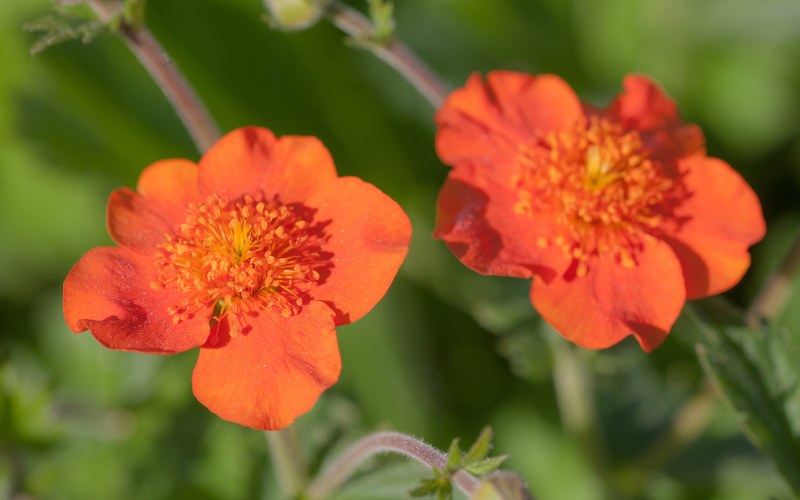
The Avens is a stunning and versatile flower. It is scientifically known as Geum. It comes in a variety of shades including yellow, orange, red, and even pink. Avens plants generally bloom in spring or early summer.
Avens plants typically prefer well-drained soil and thrive in full sun to partial shade. This versatile flower is known to attract bees and butterflies, making it an excellent choice for those looking to create a vibrant and buzzing garden. Avens plants are relatively low-maintenance.
| Scientific Name | Geum |
| Native Range | Europe and western Asia, South America |
| Flowering Season | Europe and Western Asia, South America |
Alchemilla
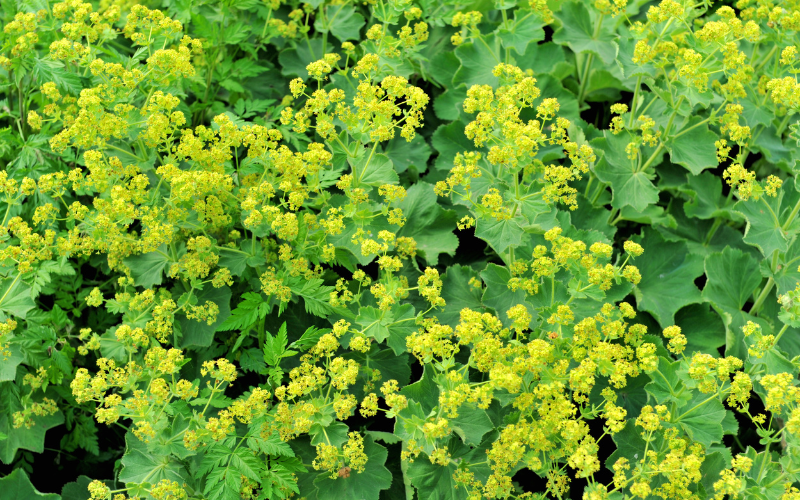
The Alchemilla is a stunning and versatile flower. It is commonly known as Lady’s Mantle. Alchemilla plants bloom in late spring to early summer. The Alchemilla flower blooms with small, yellow-green flowers that are clustered together.
Alchemilla is generally low-maintenance. Regular watering is necessary to keep the soil consistently moist, especially during dry periods. Alchemilla is often grown for its attractive foliage and its ability to form a ground cover. The leaves catch and hold droplets of rainwater, creating a beautiful dew-like effect.
| Scientific Name | Alchemilla |
| Native Range | Europe, Asia, and North America. |
| Flowering Season | Spring and early summer |
Allium Roseum
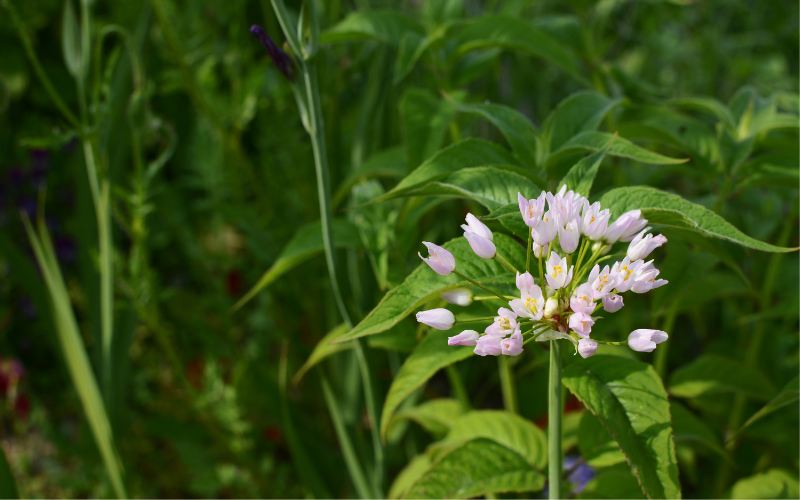
Allium Roseum is a beautiful flower. It is also known as Rosy Garlic or Rose Garlic. The umbels can measure around 2 to 3 inches (5 to 8 cm) in diameter. Allium roseum typically blooms in late spring to early summer.
Its sweet and subtle fragrance attracts bees and butterflies to your garden. Allium roseum prefers full sun to partial shade. It thrives in well-drained soil and can tolerate a range of soil types, including sandy or loamy soil.
| Scientific Name | Allium roseum |
| Native Range | Italy, Greece, Turkey, and other parts of southern Europe |
| Flowering Season | Late spring to early summer |
Aquilegia
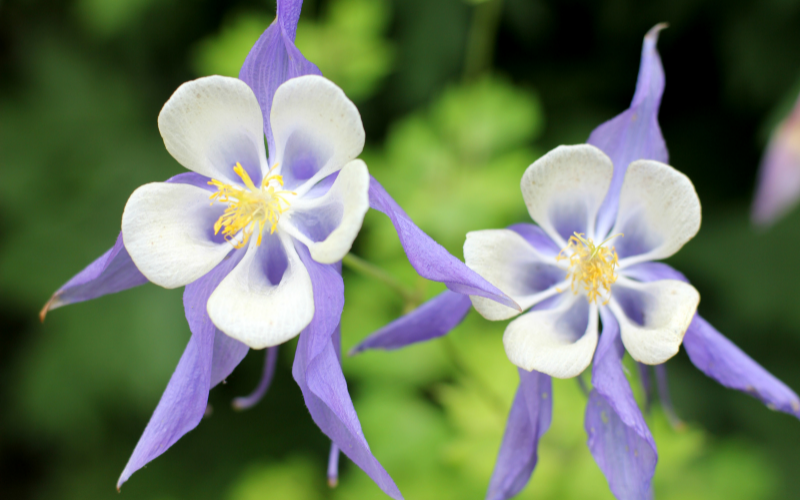
Aquilegia also known as columbine, is a beautiful flower in the Ranunculaceae family. Native to North America, Europe, and Asia this comes in a variety of colors including purple, blue, yellow, white, and pink.
Blooms in late spring to early summer prefer well-drained soil and can reach up to 3 ft. tall. Aquilegia is a gorgeous and versatile plant that brings beauty and charm to any outdoor environment with its unusual spiked petals, delicate leaves, and different colors.
| Scientific Name | Aquilegia vulgaris |
| Native Range | North America, Europe, Asia |
| Flowering Season | Spring and Early Summer |
Arum Lily
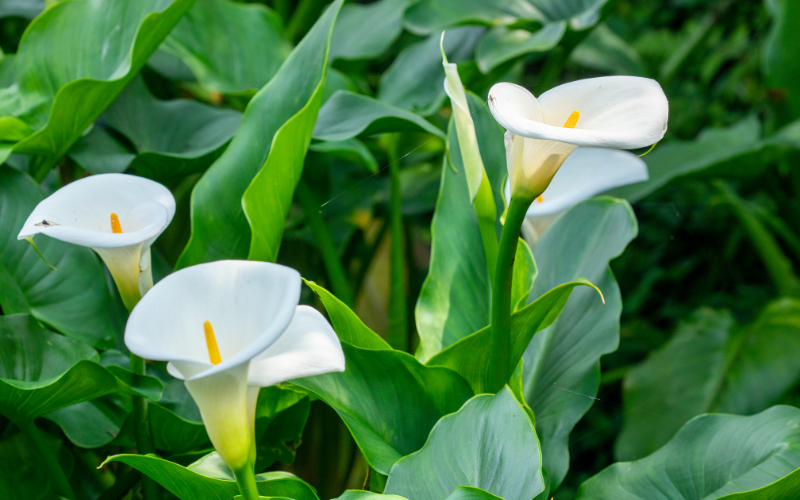
The Arum Lily is a beautiful flower in the Araceae family. It is also known as Zantedeschia aethiopica. Native to South Africa, this comes in a range of colors, including white, cream, and pale yellow.
Blooming from late spring to early summer, thrives in well-draining, fertile soil and can grow to be 3 ft. tall. Known for their funnel-shaped blooms, they have a huge, amazing spathe encircling a central spadix. The Arum Lily, with its lovely form, is truly amazing giving a touch of elegance to any place.
| Scientific Name | Zantedeschia |
| Native Range | Southern Africa in Lesotho, South Africa, and Eswatini |
| Flowering Season | Late spring and throughout the summer |
Alstroemeria
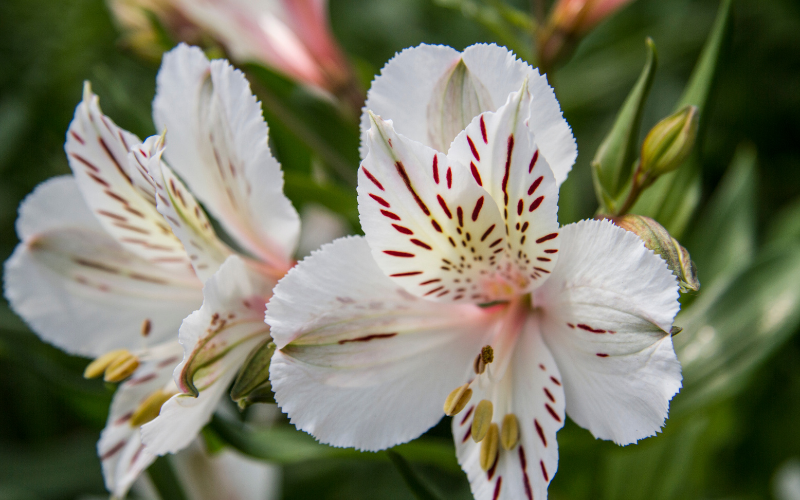
Alstroemeria, or Peruvian lily, is a pretty flower in the Alstroemeriaceae family. Native to South America these can range in color from bright oranges and yellows to delicate pinks and purples. Blooms from late spring to early fall prefer well-drained soil and can grow up to 3 ft. tall.
Alstroemerias is an elegant flower and is identified by its nice, thin stems and clusters of trumpet-shaped flowers. Each flower has six petals with unique markings and patterns that mimic freckles or stripes.
| Scientific Name | Alstroemeria |
| Native Range | South America |
| Flowering Season | Early summer |
Annual Honesty
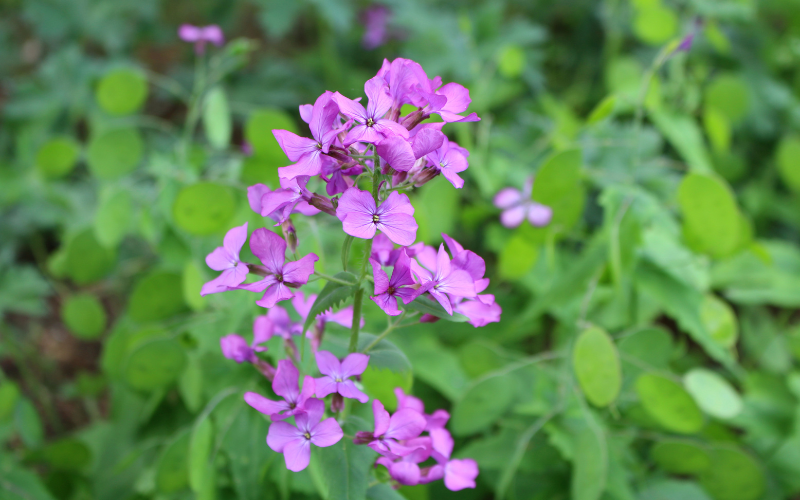
Annual Honesty, or Lunaria annua, is a stunning flower of the Brassicaceae family. Native to Europe and Western Asia, it has lovely clusters of tiny purple or white flowers that turn into eye-catching transparent seed pods.
Blooms in the spring and early summer thrive in well-drained soil and can grow up to 3 ft. tall. Annual Honesty has broad, heart-shaped leaves that provide a rich backdrop for its bright blossoms and an elegant look, with its thin stems flowing beautifully in the breeze.
| Scientific Name | Lunaria annua |
| Native Range | Southeastern Europe and Western Asia |
| Flowering Season | Spring |
Adriatic Bellflower
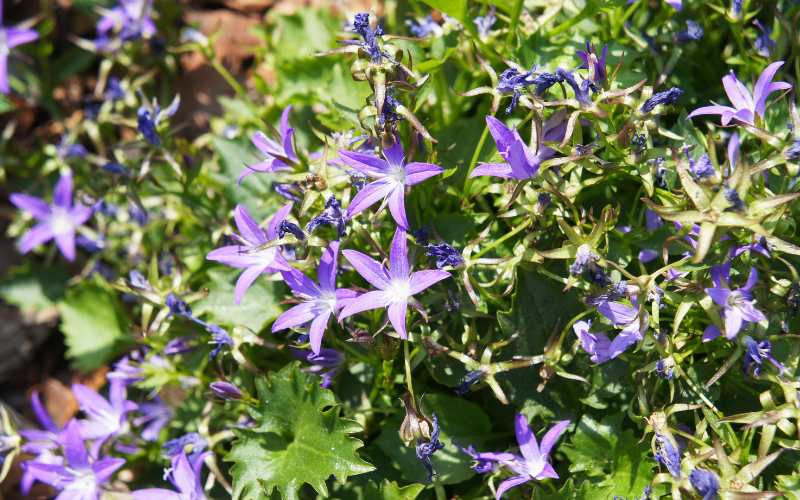
The Adriatic Bellflower, or Campanula adriatica, is a lovely flower in the Campanulaceae family. Its color ranges from mild lavender to deep purple and is native to Europe’s Adriatic region. Blooms in late spring and early summer thrive in well-drained soil and can reach a height of 24 inches.
It has beautiful bell-shaped flowers that are both bright and gentle. The Adriatic Bellflower is a true gem that can enhance the look of any garden with its amazing colors and delicate blooms.
| Scientific Name | Campanula garganica |
| Native Range | Southern Europe |
| Flowering Season | Summer |
Astrantia
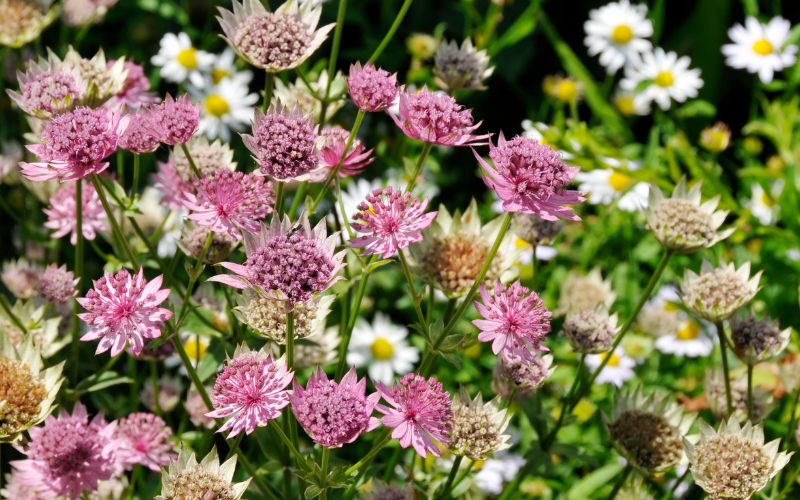
Astrantia, also known as masterwort, is part of the Apiaceae family. Native to Europe and the Caucasus this stunning flower comes in a range of hues, including pink, purple, white, and deep red.
Blooms from late spring to early summer prefer wet, well-drained soil, and can reach a height of 3 feet. Its unique look, with star-shaped flowers surrounded by papery sepals and nectar-rich flowers that attract bees and butterflies, gives a lovely touch to any area.
| Scientific Name | Astrantia |
| Native Range | Europe and Western Asia |
| Flowering Season | Late spring to early summer |
Alpine Aster

Alpine Aster, or Aster alpinus, is a beautiful flower in the Asteraceae family. Native to Europe this comes in purple, blue, pink, and white. Blooms from late spring to early summer prefer well-drained soil and can grow up to 12 inches tall.
Due to its anti-inflammatory and antiseptic traits, its extracts have been used to treat ailments such as coughs, colds, and digestive issues. Alpine Aster has thin stems and narrow, angled leaves that create a thick base rosette and have daisy-like blooms having bright yellow cores surrounded by colorful petals.
| Scientific Name | Aster alpinus |
| Native Range | Canada and the United States |
| Flowering Season | Late spring to mid-summer |
Asclepias Syriaca
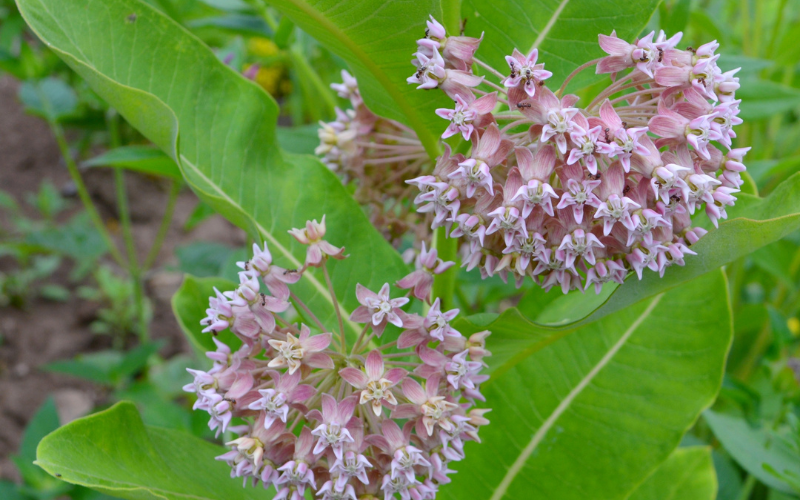
Asclepias syriaca, or Common Milkweed, is a unique plant in the Apocynaceae family. Native to North America, its colors range from pale pink to deep magenta and lure various pollinators, mainly butterflies. These demand well-drained soil and can grow up to 6 ft. tall, blooming in the summer months.
The blooms have a distinct structure and a crown-like shape around a core structure known as the corona. Its large leaves provide shelter for little insects, and the petals are a vital source of food for butterflies and bees.
| Scientific Name | Milkweed |
| Native Range | United States and Canada |
| Flowering Season | Early to Late Summer |
Amaranthus
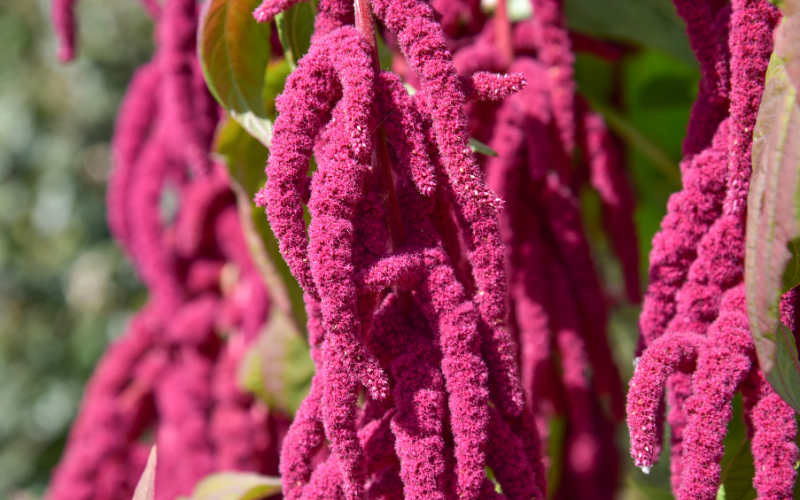
Amaranthus, or amaranth, is an amazing flower in the Amaranthaceae family. Native to America these come in red, pink, orange, yellow, and deep purple hues. Blooming from late summer to early autumn, it thrives in well-drained soil and can grow up to 8 ft. tall.
Amaranthus has anti-inflammatory and antioxidant effects. Amaranthus is a lovely plant. Its cascading flower spikes and colorful foliage set it apart in any garden. The shape of leaves can vary, with some types having broad, oval leaves and others with thin, lance-shaped leaves.
| Scientific Name | Amaranthus |
| Native Range | North and Central America |
| Flowering Season | Late spring or early summer |
Antirrhinum Majus
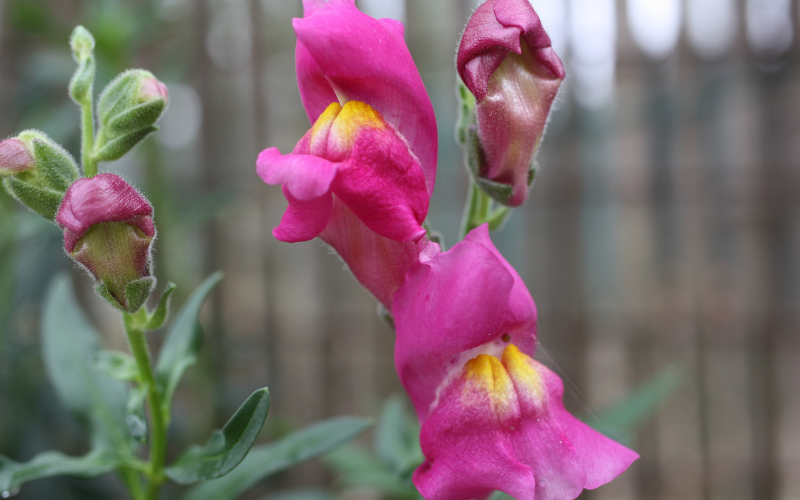
Antirrhinum Majus, or Snapdragon, belongs to the Plantaginaceae family. Native to the Mediterranean region, these come in pink, red, yellow, orange, white, and even bi-colored varieties. Blooms in the spring and summer need well-drained soil and can grow to be 3 ft. tall.
Snapdragon stands out by its unique floral structure having a tubular shape and a wide, open mouth that resembles a dragon’s head. The petals are arranged in such a way that they resemble a nose and two lips, making them very attractive
| Scientific Name | Antirrhinum majus |
| Native Range | Europe, the United States, Canada, and North Africa |
| Flowering Season | Spring to Fall |
Aztec Marigold
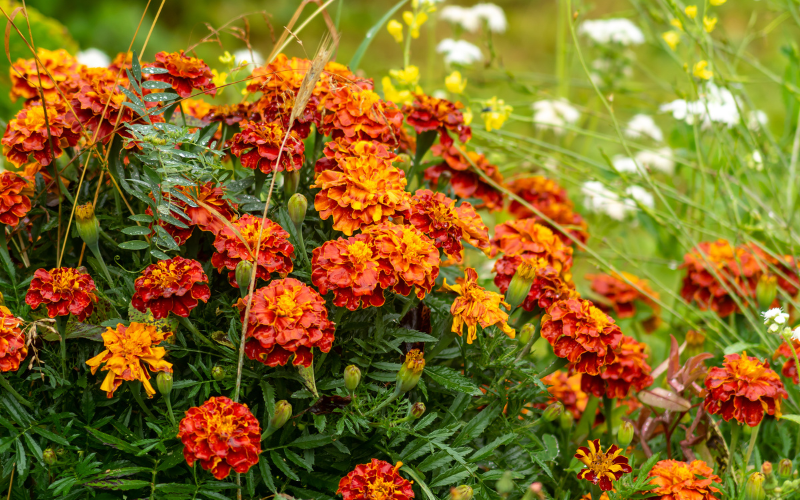
The Aztec Marigold is a beautiful flower. It is scientifically known as Tagetes erecta. It is native to Mexico and Central America. The plant typically grows to a height ranging from 1 to 4 feet (30 to 120 cm). The flowers are large, and full, and resemble fluffy pom-poms, making them a popular choice for attractive and decorative purposes.
These marigolds thrive in warm climates with well-drained soil and ample sunlight. They are relatively low-maintenance and can adapt to various soil types.
| Scientific Name | Tagetes erecta |
| Native Range | Mexico and Central America |
| Flowering Season | Summer and Fall |
Azure Monkshood
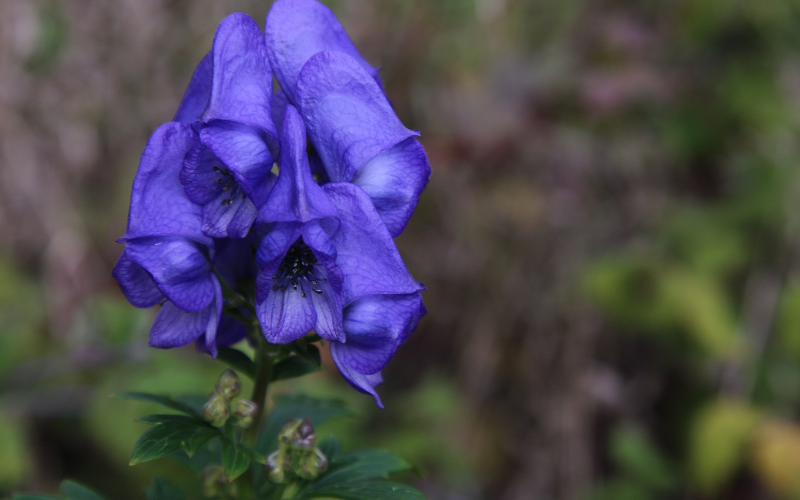
Azure Monkshood is a stunning flower. It is scientifically known as Aconitum carmichaelii. It is native to parts of Europe and Asia. The plant typically grows to a height of 3 to 4 feet (about 1 to 1.2 meters).
Azure Monkshood blooms in late summer to early fall. Azure Monkshood requires well-drained soil and partial shade for optimal growth. It has a long history of being used in ancient Greek and Chinese medicine for both hunting and warfare.
| Scientific Name | Aconitum fischeri |
| Native Range | Korea and Siberia |
| Flowering Season | Late Summer to Early Fall |
Azalea
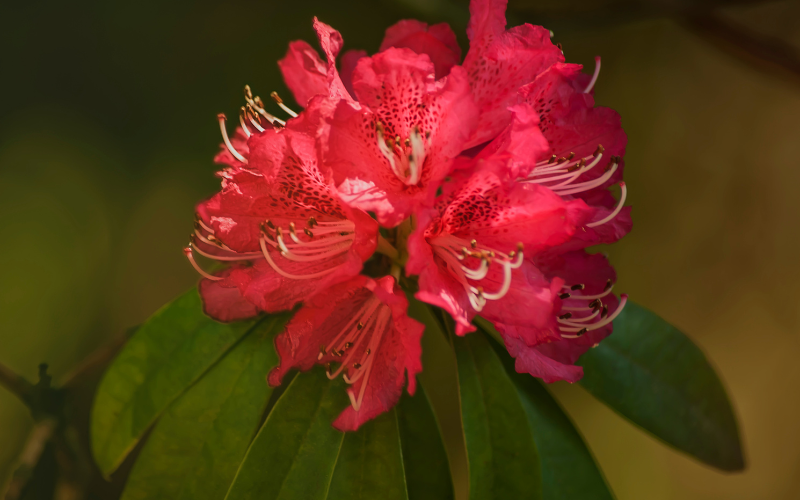
Azalea is a beautiful flower. It is scientifically known as Rhododendron spp. It is native to various regions, including Asia, North America, and Europe. It comes in a shade of pink, purple, and orange in between. These flowering plants are growing in a variety of temperatures and soil conditions.
They require well-drained, slightly acidic soil and prefer partial shade or filtered sunlight. With proper care and maintenance, these resilient flowers can continue to grace your garden year after year
| Scientific Name | Rhododendron spp. |
| Native Range | Asia, Europe and North America |
| Flowering Season | Late Winter to Early Spring |
Autumn Sage
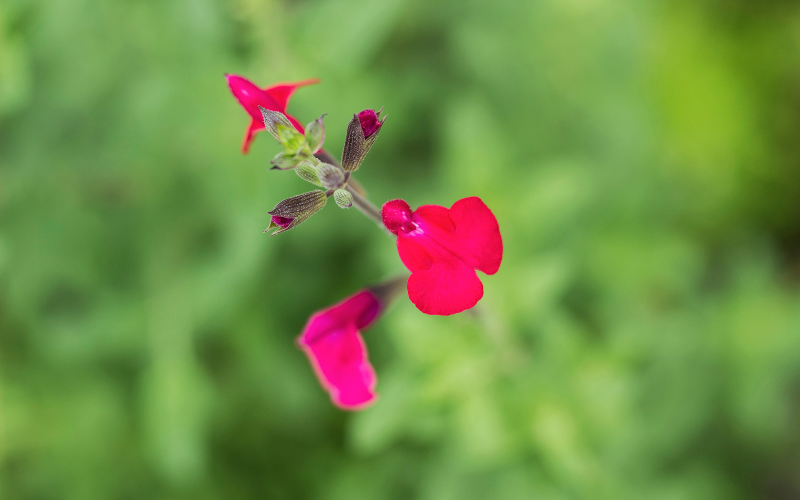
Autumn Sage is a charming flower. It is scientifically known as Salvia greggii. It is native to Texas and Mexico. It typically reaches a height of 1 to 3 feet (about 30 to 90 cm). These flowers include shades of red, pink, coral, purple, and white.
The flowers bloom from late spring through fall, with peak flowering often occurring in late summer and early autumn. Autumn Sage is easy to grow and thrives in well-drained soil and full sun to partial shade.
| Scientific Name | Salvia greggii |
| Native Range | North America |
| Flowering Season | Summer, Fall |
Asiatic Lily
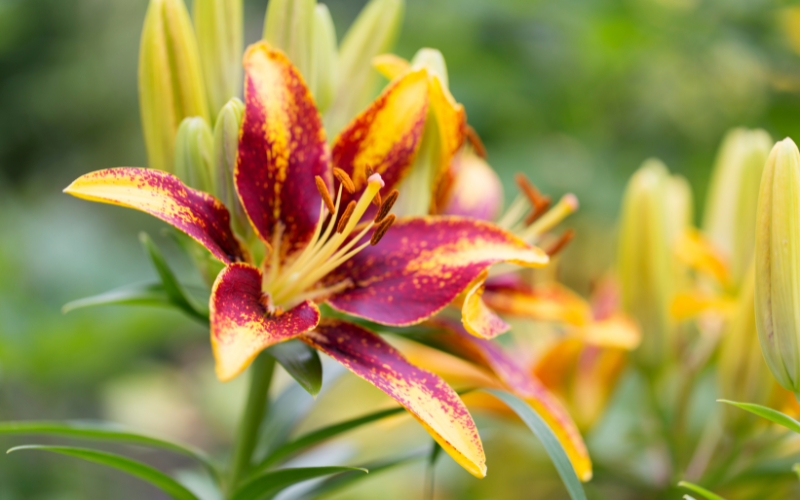
The Asiatic Lily is a stunning flower. It is scientifically known as Lilium asiaticum. It is native to various regions in Asia. The flower size varies depending on the cultivar, with diameters typically ranging from 4 to 6 inches (10 to 15 cm).
They come in a wide range of vibrant colors, including shades of red, pink, orange, yellow, and white. These lilies bloom in late spring and early summer. It thrives in full sun or partial shade.
| Scientific Name | Lilium auratum |
| Native Range | China, Japan, Korea, and the Russian Far East |
| Flowering Season | Spring |
Artichoke Thistle
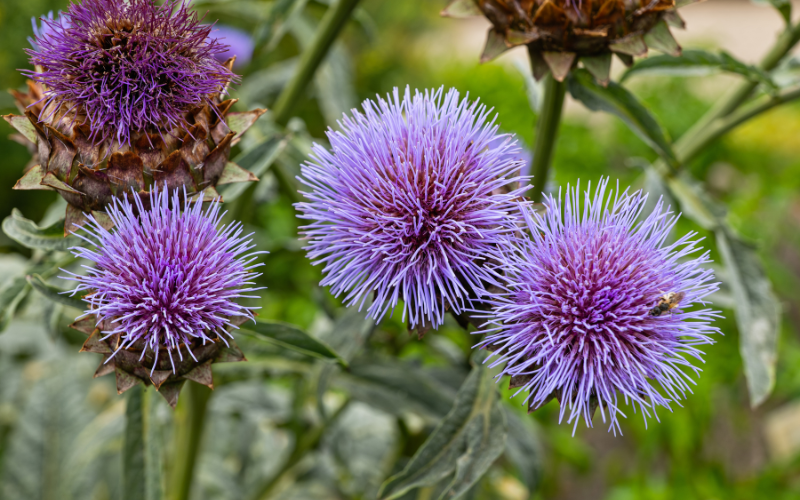
Artichoke Thistle is a unique flower. It is scientifically known as Cynara cardunculus var. It belongs to the Asteraceae family. It is native to the Mediterranean region. Thistles bloom in the late spring to early summer.
They thrive in full sun, requiring at least six hours of direct sunlight daily. It comes in a range of colors, from deep purple to vibrant pink and even creamy white.
| Scientific Name | Cynara cardunculus |
| Native Range | Europe |
| Flowering Season | Summer |
Arrowwood Viburnum
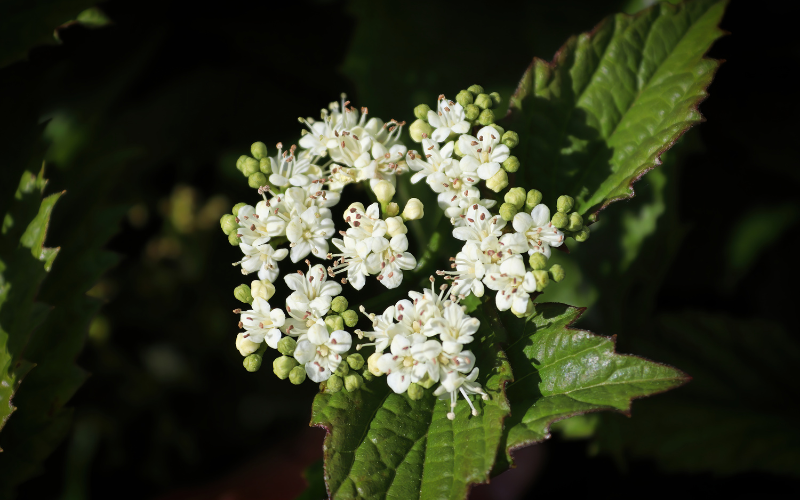
Arrowwood Viburnum is a stunning flower. It is scientifically known as Viburnum dentatum. Arrowwood Viburnum blooms in the late spring to early summer. The individual flowers are small, usually less than half an inch (about 1 cm) in diameter.
Arrowwood Viburnum flowers are primarily white, giving them a clean and elegant appearance. It thrives in full sun to partial shade, making it suitable for various garden conditions.
| Scientific Name | Viburnum dentatum |
| Native Range | Maine south to northern Florida and eastern Texas |
| Flowering Season | Late Spring to Early Summer |
Arnica
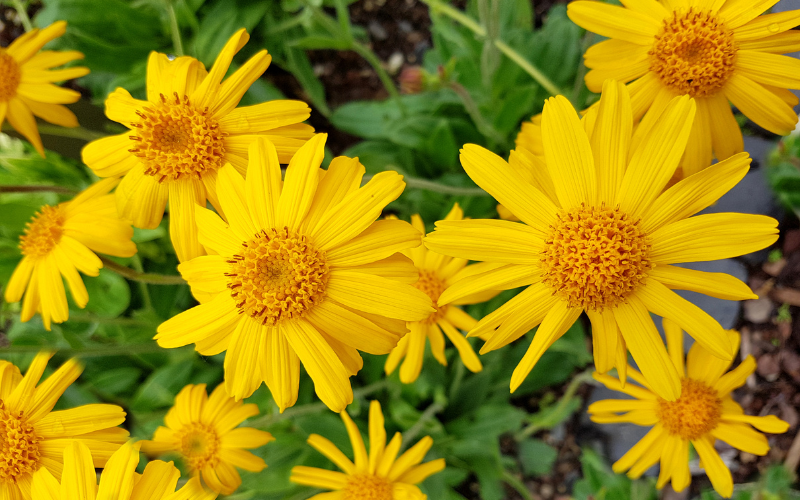
Arnica is a vibrant and beautiful flower. It is scientifically known as Arnica Montana. It is native to the mountainous regions of Europe and North America. Individual Arnica flowers are relatively small, with a diameter of about 2 to 3 inches (5 to 8 cm).
Arnica typically blooms in late spring to early summer. Arnica thrives in full sun to partial shade and prefers well-drained soil.
| Scientific Name | Arnica montana |
| Native Range | Europe |
| Flowering Season | Late Spring to Early Summer |
Armeria
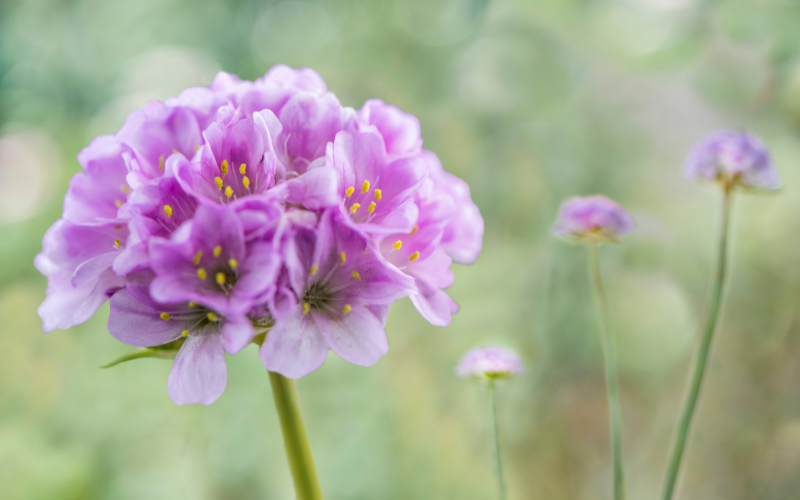
Armeria is a beautiful flower. It is commonly known as Thrift or Sea Pink. It is native to Europe and North America. Armeria flowers come in various colors, including shades of pink, purple, white, and sometimes red.
It is typically blooms from late spring to early summer. Armeria thrives in full sun but can tolerate partial shade, especially in warmer regions.
| Scientific Name | Armeria maritima |
| Native Range | Europe |
| Flowering Season | Spring |
Arabian Jasmine
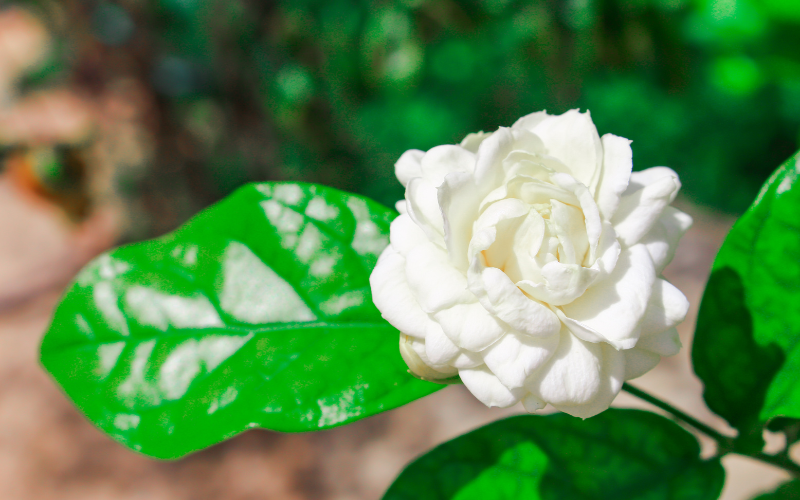
The Arabian Jasmine is a stunning flower. It is scientifically known as Jasminum sambac. It is native to tropical regions of Asia. The flowers are small, with a diameter of about 1 inch (2.5 cm).
Arabian Jasmine thrives in full sun to partial shade. It prefers at least four to six hours of sunlight per day. Arabian Jasmine is commonly grown as a decorative plant in gardens, landscapes, and containers.
| Scientific Name | Jasminum sambac |
| Native Range | Asia |
| Flowering Season | Summer |
Apple Blossom
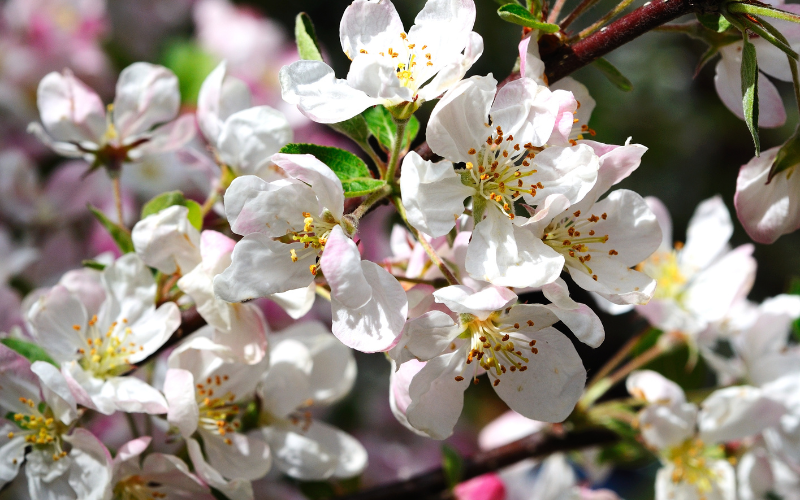
The Apple Blossom flower is beautiful. It is also known as Malus domestica. Apple blossom flowers are generally small and delicate. They typically have five rounded petals that can range in color from pure white to pale pink.
The flowers typically bloom in the spring. These flowers also attract pollinators such as bees and butterflies, playing a vital role in the ecosystem.
| Scientific Name | Malus domestica |
| Native Range | North America |
| Flowering Season | Spring |
Apache Plume
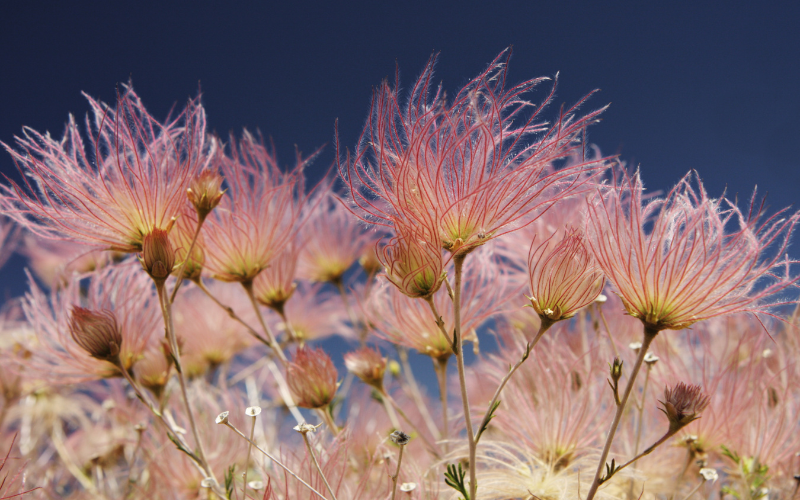
The Apache Plume is a stunning and unique flower. It is scientifically known as Fallugia paradoxa. It is native to the southwestern United States. This plant typically reaches a height of 3 to 6 feet (1 to 2 meters) and has a similar spread.
Apache plume blooms from late spring through early summer. It can be used as a focal point in rock gardens and as a border plant.
| Scientific Name | Fallugia |
| Native Range | Arizona, New Mexico, Texas, Utah, Nevada, Colorado, and into Mexico |
| Flowering Season | Spring |
Angelica
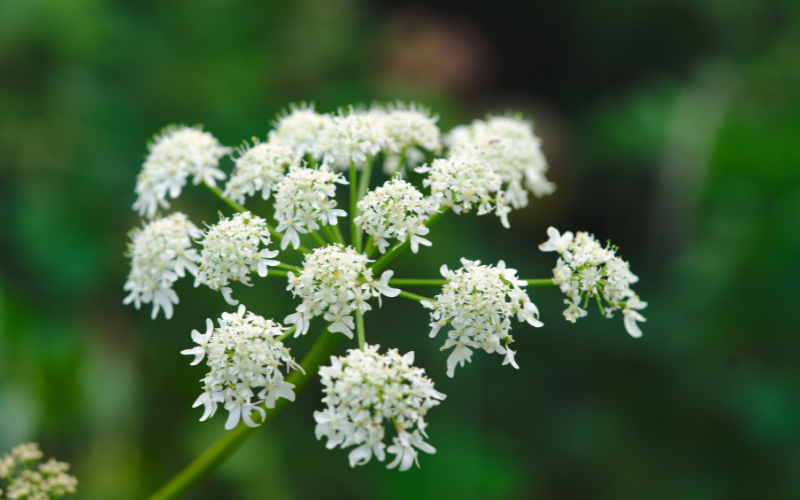
Angelica is a beautiful flower. It is scientifically known as Angelica archangelica. It is native to the northern regions of Europe and Asia. The flowers typically bloom in the second year of their growth, during the summer months.
Angelica can reach heights of 3 to 9 feet (1 to 3 meters) or even taller. It prefers partial shade to full sun and well-drained soil.
| Scientific Name | Angelica |
| Native Range | Europe, Asia, and parts of North America |
| Flowering Season | Summer |
Andromeda
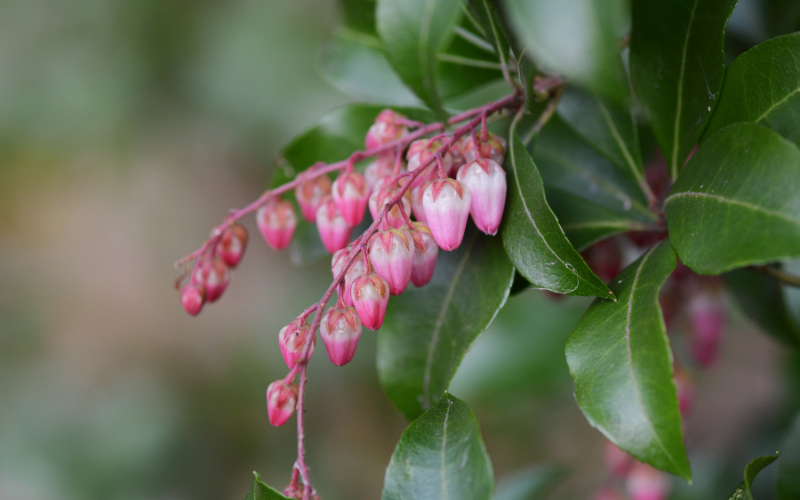
The Andromeda is a mesmerizing flower. It is scientifically known as Pieris. It is native to Asia. The flowers are typically white or shades of pink, cream, or red. The Andromeda typically ranges from 3 to 10 feet (1 to 3 meters) in height.
It is known for its early spring bloom. They thrive in acidic, well-drained soil and prefer partial shade or dappled sunlight.
| Scientific Name | Pieris japonica |
| Native Range | Hemisphere |
| Flowering Season | Spring |
Amethyst Flower
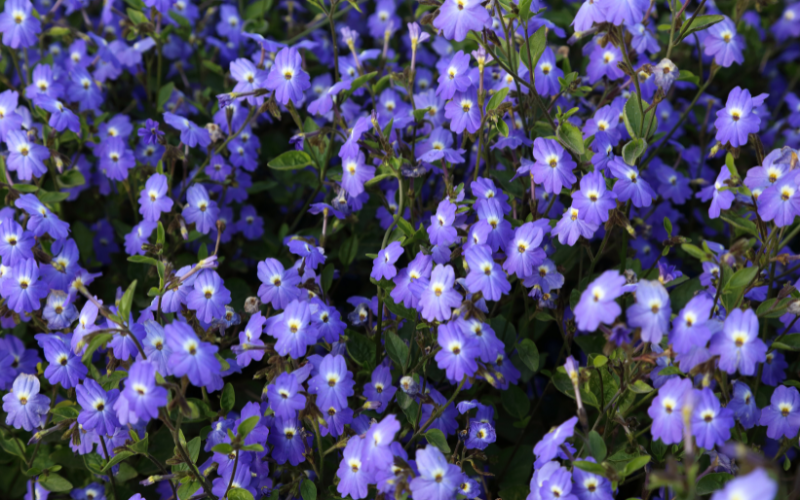
Amethyst is a stunning and unique flower. It is also known as Browallia Americana. It is native to the tropical regions of Central and South America. The amethyst is a relatively small plant, typically reaching a height of 12 to 18 inches (30 to 45 centimeters).
The flowers can also come in shades of purple and violet. It typically blooms late in the spring, through the summer, and into the fall.
| Scientific Name | Browallia americana |
| Native Range | Central and South America |
| Flowering Season | Spring |
Ambrosia
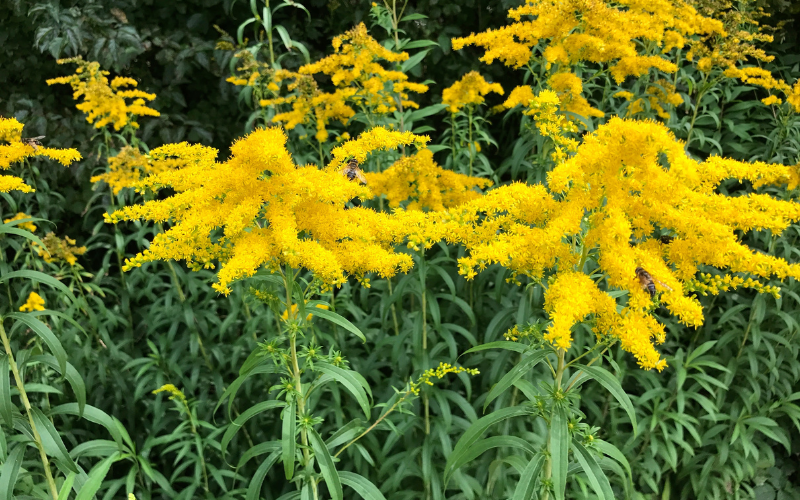
Ambrosia is a beautiful flower. It is commonly known as ragweed. It is native to North America. They typically have greenish to yellowish-green flowers. The flowers bloom in late summer and early fall.
They can thrive in various soil types and are often considered weeds. The Ambrosia flower is sure to bring joy and beauty to any space it graces.
| Scientific Name | Ambrosia artemisiifolia |
| Native Range | North America |
| Flowering Season | Late summer to early fall |
Amazon Lily
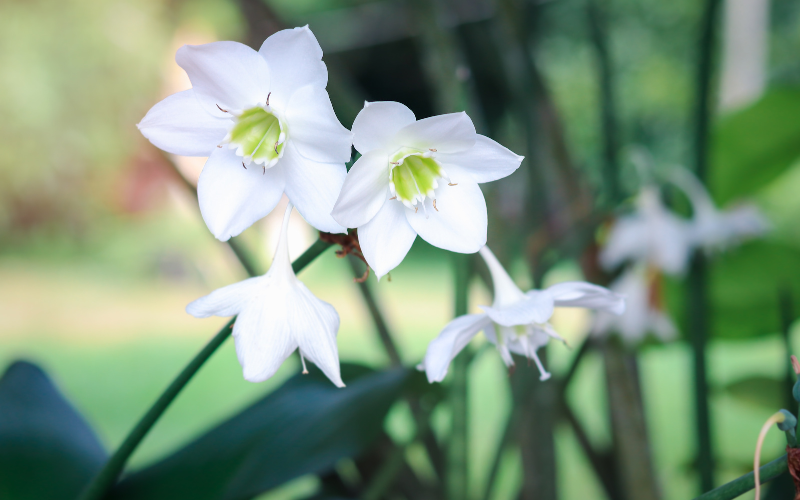
Amazon Lily is an amazing flower. It is scientifically known as Eucharis grandiflora. It is native to South America. The Amazon Lily produces elegant, white, star-shaped flowers. Each flower typically measures around 2 to 3 inches (5 to 7.5 centimeters) in diameter.
Amazon Lilies typically bloom in spring and early summer. They prefer well-draining soil and indirect or filtered sunlight.
| Scientific Name | Eucharis grandiflora |
| Native Range | Andes of Columbia and Peru |
| Flowering Season | Winter, Summer, More often in spring |
Alyogyne
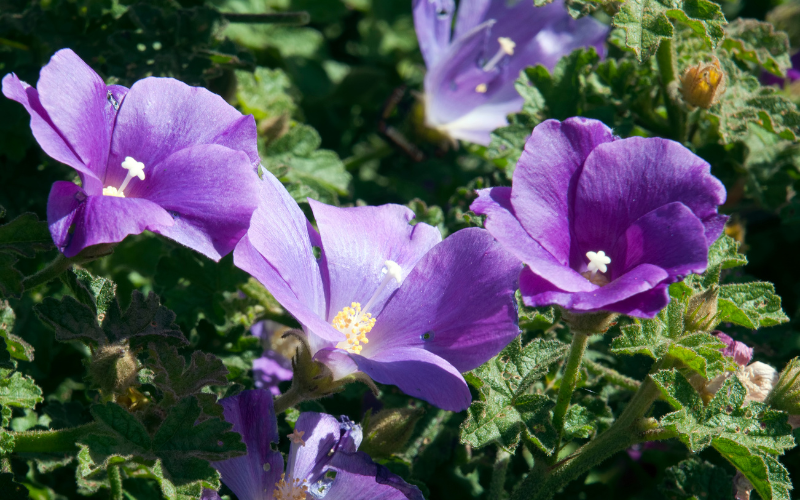
Alyogyne is a stunning flower. It is commonly known as the “Blue Hibiscus.” It is native to Australia. They come in various vibrant colors, including shades of blue, purple, pink, and white. The flowers can reach up to 4 inches in diameter, creating a striking display of color.
The alyogyne flower is also known for its long blooming season, with flowers appearing from spring through late summer, bringing joy and beauty to any outdoor space.
| Scientific Name | Alyogyne huegelii |
| Native Range | Australia |
| Flowering Season | Late spring, summer, and early autumn |
Albizia
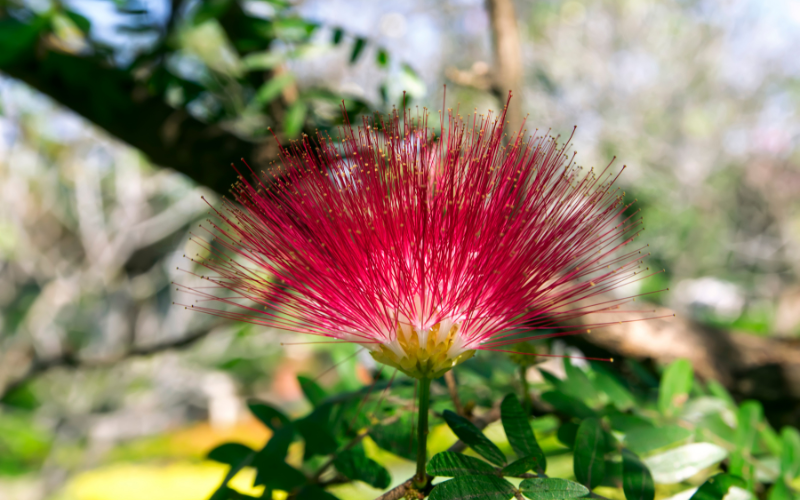
The Albizia is a mesmerizing flower. It is native to Asia and the tropical regions of Africa. The color of Albizia flowers can vary depending on the species and variety but often includes shades of pink, white, or yellow.
The flowering season for Albizia species can vary, but they generally produce blooms during the warm months of late spring and summer. They prefer well-drained soil and full sun to partial shade, depending on the species.
| Scientific Name | Albizia julibrissin Durazz |
| Native Range | Southwestern Asia and Eastern Asia |
| Flowering Season | Late spring and summer |
Alabama Crimson
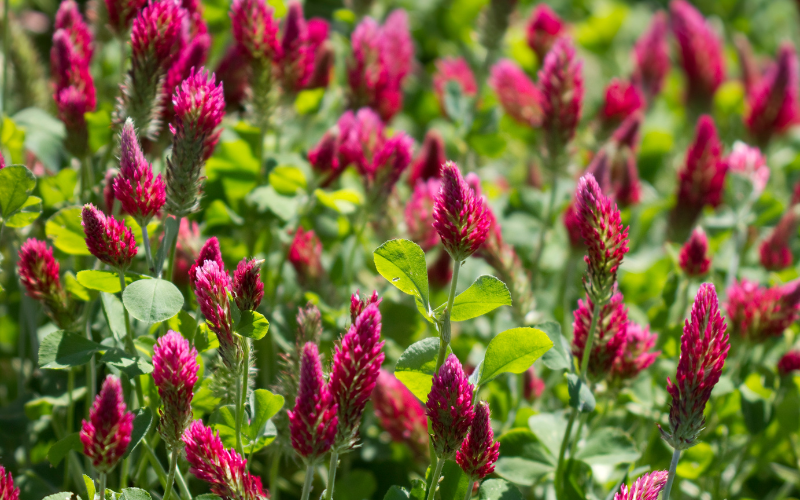
Alabama Crimson is a beautiful flower. It is also known as Lonicera sempervirens. It is native to North America. Alabama Crimson Flowers are velvety and soft to the touch, with a velveteen texture that adds to its allure. The flower blooms in late spring and early summer.
It requires a specific set of conditions to thrive, including well-drained soil and adequate sunlight. The Alabama Crimson Flower is a symbol of elegance and resilience, reflecting the spirit of its namesake state.
| Scientific Name | Lonicera sempervirens |
| Native Range | North America |
| Flowering Season | Late spring and summer |
Question & Answer
What type of flower starts with an A?
Flower names that start with “A”: Aster, Azalea, Alstroemeria, Anemone, Amaryllis, Agapanthus, Allium, Amaranth, and Anthurium.
What is a purple flower that starts with an A?
A purple flower that starts with “A” is the Aster.
What lily flower starts with A?
The lily flower that starts with “A” is the Asiatic Lily.
What red flowers start with A?
One red flower that starts with “A” is the Amaryllis.
What is the rarest flower?
One of the rarest flowers is the Ghost Orchid (Dendrophylax lindenii).
